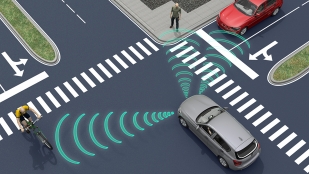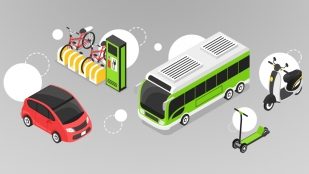Future of Transportation Part 2: Connected Vehicle Concerns—Compatibility and Security

Earlier, I shared some thoughts about the impact that connected and autonomous vehicles will have on transportation. Connected vehicles certainly have tremendous benefits, but they also raise a number of legal, technological, and ethical concerns that will have to be resolved.
Let’s say, for example, you are driving a connected car. You want to go as quickly as possible, with minimal delay. Who will control the routing of your trip? There are a number of popular mapping systems: Google, Bing, Waze. And what if your mapping system takes you through a residential neighborhood to avoid the congestion on major roads; residents may not like it. Who decides? I could go on and on with the “what if” scenarios.
It's the unknown that makes planning for the future of our roadways particularly challenging in today’s world. As we work with our clients, we want to help them think ahead so that work that’s being down now will last into the future. With that in mind, here are the top two concerns to keep in mind as connected and autonomous vehicles begin to fill the roads.
Compatibility
Cross vehicle and cross system compatibility is technological hurdle. For all vehicles and connected infrastructure to function in different regions of the world, they will have to use the same communication standards. The USDOT is working the European Union, Japan, Korea, and with Mexico and Canada on a range of Intelligent Transportation Systems (ITS) and connected vehicle technologies. The goal is to develop and grow a global marketplace for connected vehicle technologies.
Security
For years, technology analysts have sounded the alarm on cyber hackers and the potential for widespread software system breaches. In 2015, the imagined threat became real when researchers in Pittsburgh remotely took control of a Jeep Cherokee, being driven on a highway in St. Louis.
In addition to working with hackers who share security flaws, automotive and technology manufacturers are banding together to make connected vehicles more secure. Last year, a consortium of major automakers and suppliers formed the Automotive Information Sharing and Analysis Center (Auto-ISAC) to pool cyber security failures, so that the industry can collectively respond and strengthen its protocols.
All the cyber security built into vehicles and public infrastructure is only as good as the people who maintain and operate the systems. Case in point, traffic signal computers already have communication security protocols, but a recent study has shown that that most highway agencies never change the factory-set passwords that allow remote access for reprograming the equipment. Imagine the havoc if a single car is hacked, let alone an entire city traffic signal system.
Before autonomous vehicles become mainstream, security should be at a level palatable to the public, and standards for coordination are necessary to share real-time conditions and data with drivers.
We at OHM Advisors are partnering with experts to manage these concerns and find solutions that will bring smart transportation options for a safer future.



